|
|
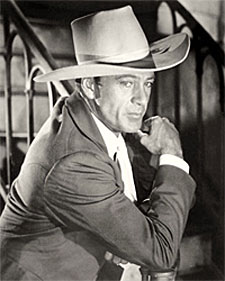 GARY COOPER GARY COOPER
(Pt. 1)
Ratings: Zero to 4 Stars.
Born in 1901 in Helena, Montana, Gary Cooper’s salad days were spent in silents supporting Tom Mix, Buck Jones, Jack Holt, Franklyn Farnum, Richard Dix, Ben Wilson, Jack Hoxie, Eileen Sedgwick and Buffalo Bill Jr. He was finally awarded third billing in “The Winning of Barbara Worth” (‘26) behind Ronald Colman and Vilma Banky then starred in “Arizona Bound”, “The Last Outlaw” and “Nevada” all in ‘27. Appearing in the Academy Award winning film “Wings” (‘27) with Buddy Rogers and Richard Arlen further solidified his standing in Hollywood. Several more silent starrers followed until he made the Western that forever cemented him as a Western film legend.
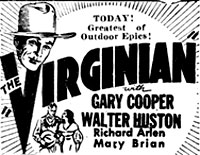     THE VIRGINIAN (‘29 Paramount) Gary Cooper’s first talkie elevated him to stardom and left a permanent mark on Western movies with this adaptation of Owen Wister’s popular novel. Filmed twice before as a silent, years later this talkie remains a classic and an essential Western. Cooper’s performance—and his unforgettable line to villain Walter Huston, “If you want to call me that, smile”—made the film a major box office success. Cooper’s drawling dialect was coached by a real Virginian, Randolph Scott. Supporting performances from Richard Arlen and Mary Brian are also excellent. No reason to rehash the plot here, if you haven’t seen “The Virginian” by now… THE VIRGINIAN (‘29 Paramount) Gary Cooper’s first talkie elevated him to stardom and left a permanent mark on Western movies with this adaptation of Owen Wister’s popular novel. Filmed twice before as a silent, years later this talkie remains a classic and an essential Western. Cooper’s performance—and his unforgettable line to villain Walter Huston, “If you want to call me that, smile”—made the film a major box office success. Cooper’s drawling dialect was coached by a real Virginian, Randolph Scott. Supporting performances from Richard Arlen and Mary Brian are also excellent. No reason to rehash the plot here, if you haven’t seen “The Virginian” by now…
ZERO ONLY THE BRAVE (‘30 Paramount) Forgettable Cooper Civil War drama has him as a Union Cavalry Captain operating as a spy behind enemy lines.
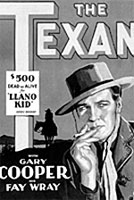  THE TEXAN (‘30 Paramount) Based on the O. Henry short story “The Double-Dyed Deceiver”, Cooper is infamous bandit The Llano Kid. He hooks up with shady Oscar Apfel who has been hired by wealthy Mexican aristocrat Emma Dunn to find her long-lost son who disappeared when he was 10. To bilk the woman out of her offered reward, Apfel has Cooper pose as the son. When Cooper falls in love with Dunn’s niece (Fay Wray) he backs out of the plot and begins to search for the real son. Remade as “The Llano Kid” in ‘39 with Tito Guizar and again as “Branded” in ‘51 with Alan Ladd. THE TEXAN (‘30 Paramount) Based on the O. Henry short story “The Double-Dyed Deceiver”, Cooper is infamous bandit The Llano Kid. He hooks up with shady Oscar Apfel who has been hired by wealthy Mexican aristocrat Emma Dunn to find her long-lost son who disappeared when he was 10. To bilk the woman out of her offered reward, Apfel has Cooper pose as the son. When Cooper falls in love with Dunn’s niece (Fay Wray) he backs out of the plot and begins to search for the real son. Remade as “The Llano Kid” in ‘39 with Tito Guizar and again as “Branded” in ‘51 with Alan Ladd.
THE SPOILERS (‘30 Paramount) The first sound version of the Rex Beach novel which was filmed as a silent in 1914 and 1923. Unfortunately unavailable for viewing.
ZERO FIGHTING CARAVANS (‘31 Paramount) Very dated early sound “Covered Wagon” imitator claiming to be based on a Zane Grey story. Expensive, well-photographed (Lee Garmes, Henry Gerrard) but—hopelessly boring. At an overlong 84 minutes, it is terribly talky (much of it sappy and overly sentimental) and overacted to nearly the point of broad comedy at times as directed by Otto Brower and David Burton. Boyish in buckskins, wagon train scout Cooper and his two pals, Ernest Torrence and Tully Marshall, leave Missouri with freight wagons bringing supplies and immigrants to California while the Civil War rages back east. Along for the trip is French girl Lily Damita (once married to Errol Flynn) with whom Cooper strikes up a romance during tedious, over-scripted campfire scenes. Over mountains, through the snow, cross the plains, on the caravan (and the film) drags—until outlaw Fred Kohler Sr. and his renegade Indians attack the train. The production was so big it took two directors, two cinematographers and nine musical score composers. All to no avail. There was so much left over footage it was used in the ‘34 remake “Wagon Wheels” with Randolph Scott, which wasn’t much better, but shorter.
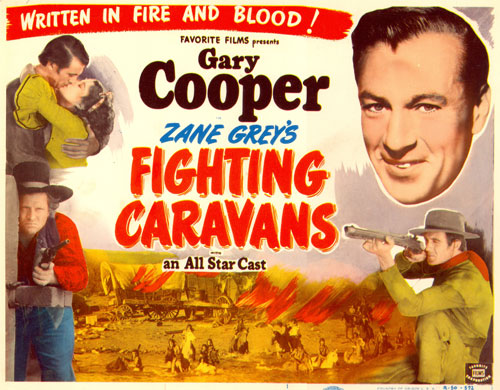
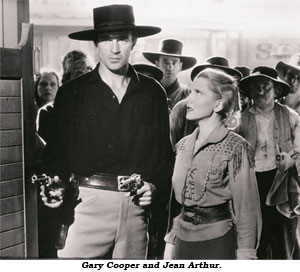    THE PLAINSMAN (‘36 Paramount) Having little or no success with Westerns following up his triumph in “The Virginian”, Cooper finally hit the big time again with “A Farewell to Arms” in ‘32, “Lives of a Bengal Lancer” (‘35), “Mr. Deeds Goes to Town” (‘36) among others and triumphantly returned to the West as Cecil B. De Mille’s “The Plainsman”, the film that forever established him as a Western hero. Of course, the movie has little to do with the real facts, but let’s not let that get in the way of a rousing adventure. Cooper is Wild Bill Hickok, Jean Arthur is a glamorized, wisecracking, whip-cracking Calamity Jane and James Ellison (on leave from the Hopalong Cassidy pictures) is Buffalo Bill. They all mix it up for 115 action packed, melodramatic minutes with grinning villain Charles Bickford and a lot of Indians before the tragic end. Unfortunately, De Mille hated working outdoors, so virtually the entire movie was filmed on the Paramount backlot with painted backdrops and rear projection. THE PLAINSMAN (‘36 Paramount) Having little or no success with Westerns following up his triumph in “The Virginian”, Cooper finally hit the big time again with “A Farewell to Arms” in ‘32, “Lives of a Bengal Lancer” (‘35), “Mr. Deeds Goes to Town” (‘36) among others and triumphantly returned to the West as Cecil B. De Mille’s “The Plainsman”, the film that forever established him as a Western hero. Of course, the movie has little to do with the real facts, but let’s not let that get in the way of a rousing adventure. Cooper is Wild Bill Hickok, Jean Arthur is a glamorized, wisecracking, whip-cracking Calamity Jane and James Ellison (on leave from the Hopalong Cassidy pictures) is Buffalo Bill. They all mix it up for 115 action packed, melodramatic minutes with grinning villain Charles Bickford and a lot of Indians before the tragic end. Unfortunately, De Mille hated working outdoors, so virtually the entire movie was filmed on the Paramount backlot with painted backdrops and rear projection.
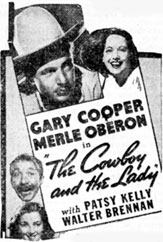  THE COWBOY AND THE LADY (‘39 U.A.) Minor affair has rodeo cowboy Cooper involved with socialite-on-the-run Merle Oberon. Even with Patsy Kelly, Walter Brennan, Fuzzy Knight, Mabel Todd and Harry Davenport in the supporting cast this is an unfunny loser for Cooper sandwiched in between two major successes—“Adventures of Marco Polo” (‘38) and “Beau Geste” (‘39). THE COWBOY AND THE LADY (‘39 U.A.) Minor affair has rodeo cowboy Cooper involved with socialite-on-the-run Merle Oberon. Even with Patsy Kelly, Walter Brennan, Fuzzy Knight, Mabel Todd and Harry Davenport in the supporting cast this is an unfunny loser for Cooper sandwiched in between two major successes—“Adventures of Marco Polo” (‘38) and “Beau Geste” (‘39).
    THE WESTERNER (‘40 U.A.) “A superior Western that mixes terrific performances, fine cinematography and a script of higher intelligence
than most to produce an excellent film,” wrote one reviewer. Law-abiding drifter Cooper runs afoul of the law when he is falsely accused of horse theft and is brought before Walter Brennan as Judge Roy Bean—the Law West of the Pecos. Brennan tries Cooper in a hasty mockery of justice and sentences him to hang, but Cooper, knowing of Brennan’s worship of stage star Lily Langtry (for whom Brennan’s THE WESTERNER (‘40 U.A.) “A superior Western that mixes terrific performances, fine cinematography and a script of higher intelligence
than most to produce an excellent film,” wrote one reviewer. Law-abiding drifter Cooper runs afoul of the law when he is falsely accused of horse theft and is brought before Walter Brennan as Judge Roy Bean—the Law West of the Pecos. Brennan tries Cooper in a hasty mockery of justice and sentences him to hang, but Cooper, knowing of Brennan’s worship of stage star Lily Langtry (for whom Brennan’s
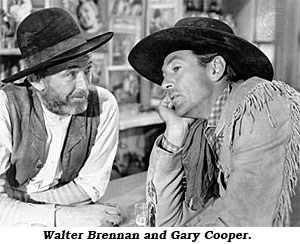 town is named), convinces Brennan he is an intimate friend of the Jersey Lily and will obtain a lock of her hair for the Judge if he lets him go. The Judge sees through Cooper’s ruse and later that night Cooper escapes. Soon learning Brennan is behind the cattlemen’s night-riding efforts to drive out the nesters and having fallen in love with a homesteader’s daughter (Doris Davenport), Cooper elects to stay in the area to help combat Brennan’s men. It all leads to an epic showdown in a gas lit hall in Fort Davis where Brennan has gone to see Lily Langtry in person for the first time. Brennan steals the picture, making his Judge Roy Bean one of the most unforgettable characters ever seen in a Western. His performance won him his third Academy Award. Ably directed by William Wyler with excellent support from Fred Stone, Paul Hurst, Chill Wills, Tom Tyler, Forrest Tucker (terrific fist fight between Tuck in his first film and Cooper), Dana Andrews, Lupita Tovar, Trevor Bardette and Lillian Bond as Lily Langtry. Look also for bit parts from B-Western stalwarts Art Mix, Blackjack Ward, Jim Corey, Ted Wells, Buck Connor, Stanley Andrews, Hank Bell. town is named), convinces Brennan he is an intimate friend of the Jersey Lily and will obtain a lock of her hair for the Judge if he lets him go. The Judge sees through Cooper’s ruse and later that night Cooper escapes. Soon learning Brennan is behind the cattlemen’s night-riding efforts to drive out the nesters and having fallen in love with a homesteader’s daughter (Doris Davenport), Cooper elects to stay in the area to help combat Brennan’s men. It all leads to an epic showdown in a gas lit hall in Fort Davis where Brennan has gone to see Lily Langtry in person for the first time. Brennan steals the picture, making his Judge Roy Bean one of the most unforgettable characters ever seen in a Western. His performance won him his third Academy Award. Ably directed by William Wyler with excellent support from Fred Stone, Paul Hurst, Chill Wills, Tom Tyler, Forrest Tucker (terrific fist fight between Tuck in his first film and Cooper), Dana Andrews, Lupita Tovar, Trevor Bardette and Lillian Bond as Lily Langtry. Look also for bit parts from B-Western stalwarts Art Mix, Blackjack Ward, Jim Corey, Ted Wells, Buck Connor, Stanley Andrews, Hank Bell.
  NORTHWEST MOUNTED POLICE (‘40 Paramount) Overblown, overlong (125 minutes), convoluted romantic entanglements as Texas Ranger Cooper and the Mounties (Preston Foster, Robert Preston, Regis Toomey) boldly battle Indians and half-breeds (Francis McDonald, George Bancroft, Indian Chief Walter Hampden) during the Riel Rebellion in Canada in 1885. This was director Cecil B. De Mille’s first Technicolor epic and gratifyingly benefits from the red coats that brighten the screen and impressed at the time. Female entanglements come from nurse Madeline Carroll and wildly overacting Paulette Goddard as Bancroft’s half-breed vixen sister. Huge supporting cast includes Lon Chaney Jr., Akim Tamiroff, Richard Denning, Rod Cameron, Douglas Kennedy, Robert Ryan, Ralph Byrd, Lane Chandler, Chief Thunder Cloud, Kermit Maynard, Tony Caruso, Monte Blue, Jack Luden, John Hart, Bud Geary, Donald Curtis and others—most of whom you’ll miss if you blink. As usual with De Mille, too many indoor soundstages substitute for outdoor scenes giving the film a confining look. Although one of the six top boxoffice grossers of 1940, today it seems melodramatically dated. NORTHWEST MOUNTED POLICE (‘40 Paramount) Overblown, overlong (125 minutes), convoluted romantic entanglements as Texas Ranger Cooper and the Mounties (Preston Foster, Robert Preston, Regis Toomey) boldly battle Indians and half-breeds (Francis McDonald, George Bancroft, Indian Chief Walter Hampden) during the Riel Rebellion in Canada in 1885. This was director Cecil B. De Mille’s first Technicolor epic and gratifyingly benefits from the red coats that brighten the screen and impressed at the time. Female entanglements come from nurse Madeline Carroll and wildly overacting Paulette Goddard as Bancroft’s half-breed vixen sister. Huge supporting cast includes Lon Chaney Jr., Akim Tamiroff, Richard Denning, Rod Cameron, Douglas Kennedy, Robert Ryan, Ralph Byrd, Lane Chandler, Chief Thunder Cloud, Kermit Maynard, Tony Caruso, Monte Blue, Jack Luden, John Hart, Bud Geary, Donald Curtis and others—most of whom you’ll miss if you blink. As usual with De Mille, too many indoor soundstages substitute for outdoor scenes giving the film a confining look. Although one of the six top boxoffice grossers of 1940, today it seems melodramatically dated.
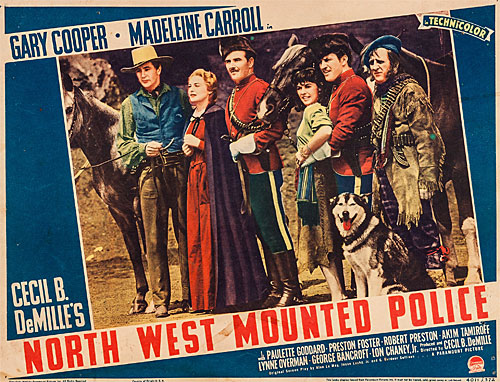
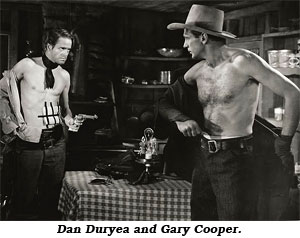     ALONG CAME JONES (‘45 RKO) Witty, thoroughly entertaining spoof of Westerns starring Cooper (who also produced) as an inept, gun-shy saddle bum. When Cooper and sidekick William Demarest drift into town Cooper is mistaken for notorious badman Dan Duryea, immediately winning the fearful respect of the townsfolk. But the charade collapses with Duryea eventually shows up and challenges Cooper. Fortunately, Cooper is saved by sharp-shooting Loretta Young whom Cooper has been unsuccessfully wooing. Only Cooper could have pulled off this Western satire, and he does it marvelously. ALONG CAME JONES (‘45 RKO) Witty, thoroughly entertaining spoof of Westerns starring Cooper (who also produced) as an inept, gun-shy saddle bum. When Cooper and sidekick William Demarest drift into town Cooper is mistaken for notorious badman Dan Duryea, immediately winning the fearful respect of the townsfolk. But the charade collapses with Duryea eventually shows up and challenges Cooper. Fortunately, Cooper is saved by sharp-shooting Loretta Young whom Cooper has been unsuccessfully wooing. Only Cooper could have pulled off this Western satire, and he does it marvelously.
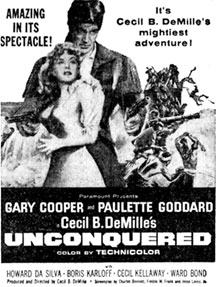  UNCONQUERED (‘47 Paramount) Cecil B. De Mille’s epics became longer and weightier as time went by until the bloated “Unconquered” collapsed under its own overwrought 146 minute weight. The audience agreed, the film lost a fortune at the boxoffice and it would be three years before Cooper returned to the saddle in 1950. Set during the Indian Wars in pre-Revolutionary pioneer days, the plot has lecherous Howard Da Silva lusting after indentured servant Paulette Goddard. On the auction block, Da Silva is foiled by Cooper who bids a higher price and frees the girl. As a gunrunner Da Silva goes on to unite with Seneca Chief Boris Karloff. Goddard falls into Da Silva’s hands once again; convincing her Cooper’s purchase was fraudulent. Continually rescuing Goddard, it all culminates in a massive battle as the Indians attack Fort Pitt. The expansive cast includes Ward Bond, Mike Mazurki, Henry Wilcoxen, Virginia Grey, Marc Lawrence, Jane Nigh, Lloyd Bridges, Raymond Hatton, Dick Alexander, Syd Saylor, Si Jenks, Bob Kortman, Ray Teal, Chief Thunder Cloud, John Merton, Buddy Roosevelt, Jay Silver-heels, Lex Barker, Fred Kohler Jr., Francis Ford, Lane Chandler, Jeff Corey, Iron Eyes Cody, Francis McDonald—most of whom blink and you’ll miss. (Cooper’s ‘50s Westerns will be covered next month.) UNCONQUERED (‘47 Paramount) Cecil B. De Mille’s epics became longer and weightier as time went by until the bloated “Unconquered” collapsed under its own overwrought 146 minute weight. The audience agreed, the film lost a fortune at the boxoffice and it would be three years before Cooper returned to the saddle in 1950. Set during the Indian Wars in pre-Revolutionary pioneer days, the plot has lecherous Howard Da Silva lusting after indentured servant Paulette Goddard. On the auction block, Da Silva is foiled by Cooper who bids a higher price and frees the girl. As a gunrunner Da Silva goes on to unite with Seneca Chief Boris Karloff. Goddard falls into Da Silva’s hands once again; convincing her Cooper’s purchase was fraudulent. Continually rescuing Goddard, it all culminates in a massive battle as the Indians attack Fort Pitt. The expansive cast includes Ward Bond, Mike Mazurki, Henry Wilcoxen, Virginia Grey, Marc Lawrence, Jane Nigh, Lloyd Bridges, Raymond Hatton, Dick Alexander, Syd Saylor, Si Jenks, Bob Kortman, Ray Teal, Chief Thunder Cloud, John Merton, Buddy Roosevelt, Jay Silver-heels, Lex Barker, Fred Kohler Jr., Francis Ford, Lane Chandler, Jeff Corey, Iron Eyes Cody, Francis McDonald—most of whom blink and you’ll miss. (Cooper’s ‘50s Westerns will be covered next month.)
top of page |

